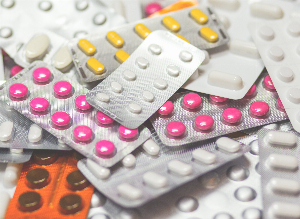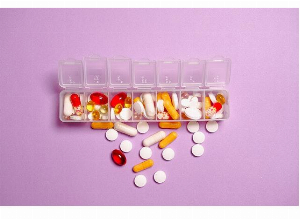Medications you should never mix with alcohol!
Published Aug 6, 2022 • By Berthe Nkok
Mixing certain medications with alcohol can cause serious side effects such as drowsiness, dehydration and difficulty breathing.
What are these medications? Why shouldn't they be taken with alcohol?
We explain it all in our article!

A lot of medications interact with alcohol and can sometimes cause serious side effects. Nausea, coma, or respiratory failure - the effects of alcohol associated with certain molecules can be quite dangerous.
There are two possible scenarios. Alcohol can delay the breakdown of some drugs, prolonging their action and causing side effects. Or, on the contrary, alcohol can accelerate the digestion of certain molecules and considerably reduce the effectiveness of the treatment.
In order to better understand the dangers of mixing alcohol with medication, it is necessary to recall the risks that come with drinking alcohol.
What are the risks of drinking alcohol?
It is well known that alcohol is dangerous for our health and should be consumed in moderation for a number of reasons, including its psychotropic properties and its impact on our behavior, such as aggressiveness, road accidents, alcohol-induced coma, etc., which generally happen shortly after we consume alcohol.
But alcohol also plays an important role in the development of many diseases such as cancer, liver disease, cardiovascular and digestive disorders, nervous system disorders and psychiatric disorders.
What medications should not be mixed with alcohol?
The effects of alcohol in combination with medication depend mainly on the duration of exposure to alcohol and the dose of medication taken. However, in most cases, the risk can be reduced if the use of alcohol is only occasional and if the dose of the treatment in question is reduced, but it should never be decided by the patient alone, without the advice of a healthcare professional.
Alcohol and psychotropic medications
In general, alcohol affects the central nervous system. As a result, it has a depressant effect on the brain, as do other drugs such as anxiolytics, sleeping pills, neuroleptics and tranquillisers. By acting on the same receptors, alcohol reinforces the effects of these drugs, especially their sedative properties. Therefore, this mixture should be avoided at all costs as it can cause breathing difficulties, coma and even death, in addition to drowsiness and confusion.
These contraindications also apply to opiates and certain antihistamines. According to the CDC website, alcohol is responsible for 22% of opiate-related deaths. Therefore, it is strongly advised to abstain from drinking alcohol during treatment with anxiolytics, hypnotics, opiates and neuroleptics.
Alcohol and anti-epileptic drugs
If alcohol can intensify the side effects of certain drugs, it can also accelerate their digestion and thus limit their effectiveness. Ethanol is a small molecule that is easily absorbed by the gastrointestinal mucosa, 80% of which is absorbed in the intestine. In the digestive system, alcohol monopolizes the same enzymes as certain drugs, thus competing with them. Depending on the molecule, the metabolism of the drugs is therefore either accelerated or slowed down.
For example, daily consumption of alcohol in combination with anti-epileptic treatment makes it less effective. As a result, the patient's own body puts them at risk of seizures by eliminating the treatment more quickly. Conversely, alcohol can slow down the breakdown of some molecules and therefore increase their effectiveness.
Alcohol, blood thinners and antibiotics
Blood thinners, anti-vitamin K drugs and antibiotics should not be combined with alcohol. There is a risk that the effect of these medications will increase or decrease after being metabolized in the liver together with alcohol. This is the case of warfarin, for example, which prevents the formation of blood clots. When mixed with alcohol, this molecule makes the blood more fluid, so the risk of hemorrhage increases.
Alcohol and diabetes medication
Drinking alcohol when you have diabetes is not recommended. Most diabetes treatments interact with alcohol, causing hypoglycemia, which can progress to coma. In addition, alcohol masks the symptoms of hypoglycemia, making emergency treatment of this complication of diabetes difficult.
Alcohol and other medications
Drug and alcohol interactions are complex and can sometimes only be assessed on a case-by-case basis. A handful of rare drugs are completely contraindicated, namely: oral antifungal treatments, acitretin and methotrexate.
Another lesser-known consequence is the increased risk of digestive side effects (ulcers, digestive bleeding) from aspirin or non-steroidal anti-inflammatory drugs (NSAIDs) (e.g. ibuprofen, naproxen or ketoprofen) when taken in combination with alcohol.
Some antiparasitic drugs mixed with alcohol cause the effects mentioned for anticoagulants and antibiotics, because acetaldehyde, a component of alcohol, accumulates in the blood and causes the same side effects. Daily combination of paracetamol and alcohol, even in low doses, can cause liver damage.
Alcohol consumption should also be avoided with drugs that have antabuse (disulfaram)-like effect, i.e. that cause vomiting, flushing, discomfort, sweating and tachycardia.
In any case, treatment should not be stopped without the advice of a healthcare professional. Ideally, it is recommended to limit alcohol consumption as much as possible and to follow medication instructions or the advice of your doctor or pharmacist.
Give it a "like" and share your thoughts and questions with the community in the comments below!
Take care!
Sources :
Médicament et alcool : danger, effet, lesquels éviter ?, Journal des Femmes Santé
Alcool et médicaments : quels mélanges sont les plus dangereux ?, Femme Actuelle
Alcool et médicaments : quels sont les mélanges les plus risqués ?, France Tv Info
L’alcool et les médicaments, Médicament Info Service
Alcool et médicaments : attention danger, Giphar
Médicaments et alcool, Vidal
Comments
You will also like

What are the dangers associated with the over-the-counter sale of certain medicines?
Dec 19, 2020 • 6 comments

 Facebook
Facebook Twitter
Twitter

